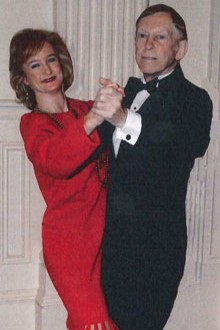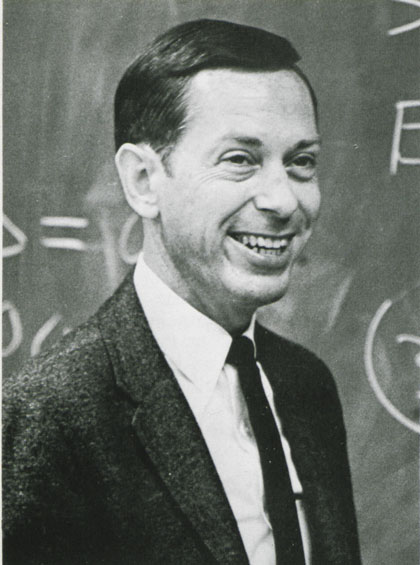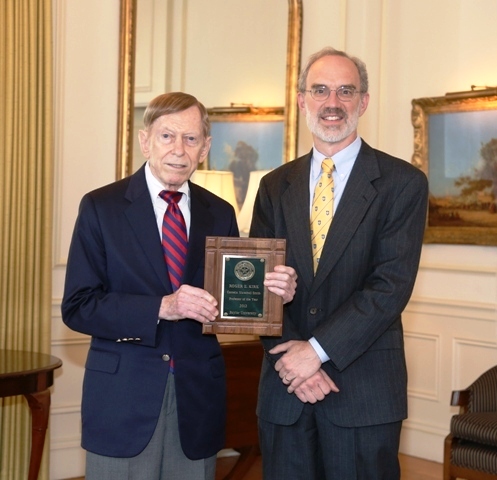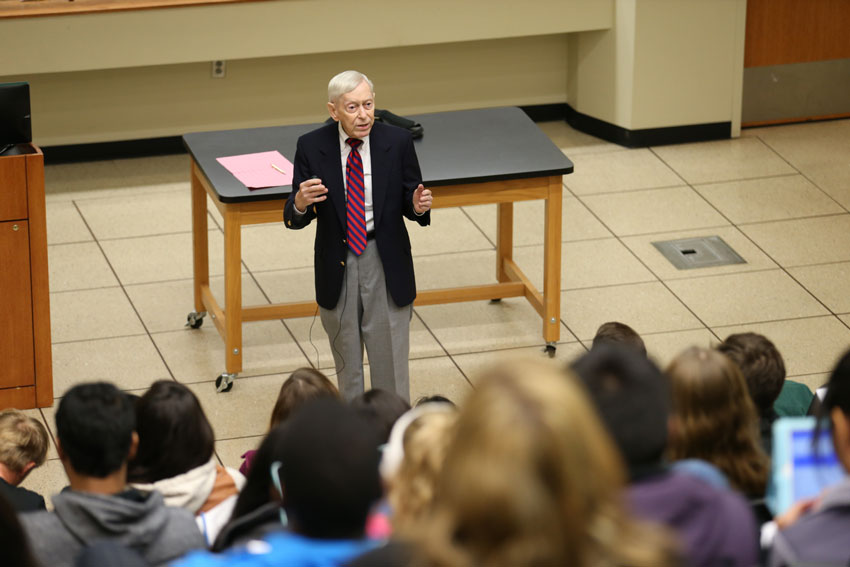Baylor Mourns Death of Emeritus Distinguished Professor Roger E. Kirk
A Master Teacher and revered scholar, Dr. Kirk was Baylor’s longest-serving faculty member
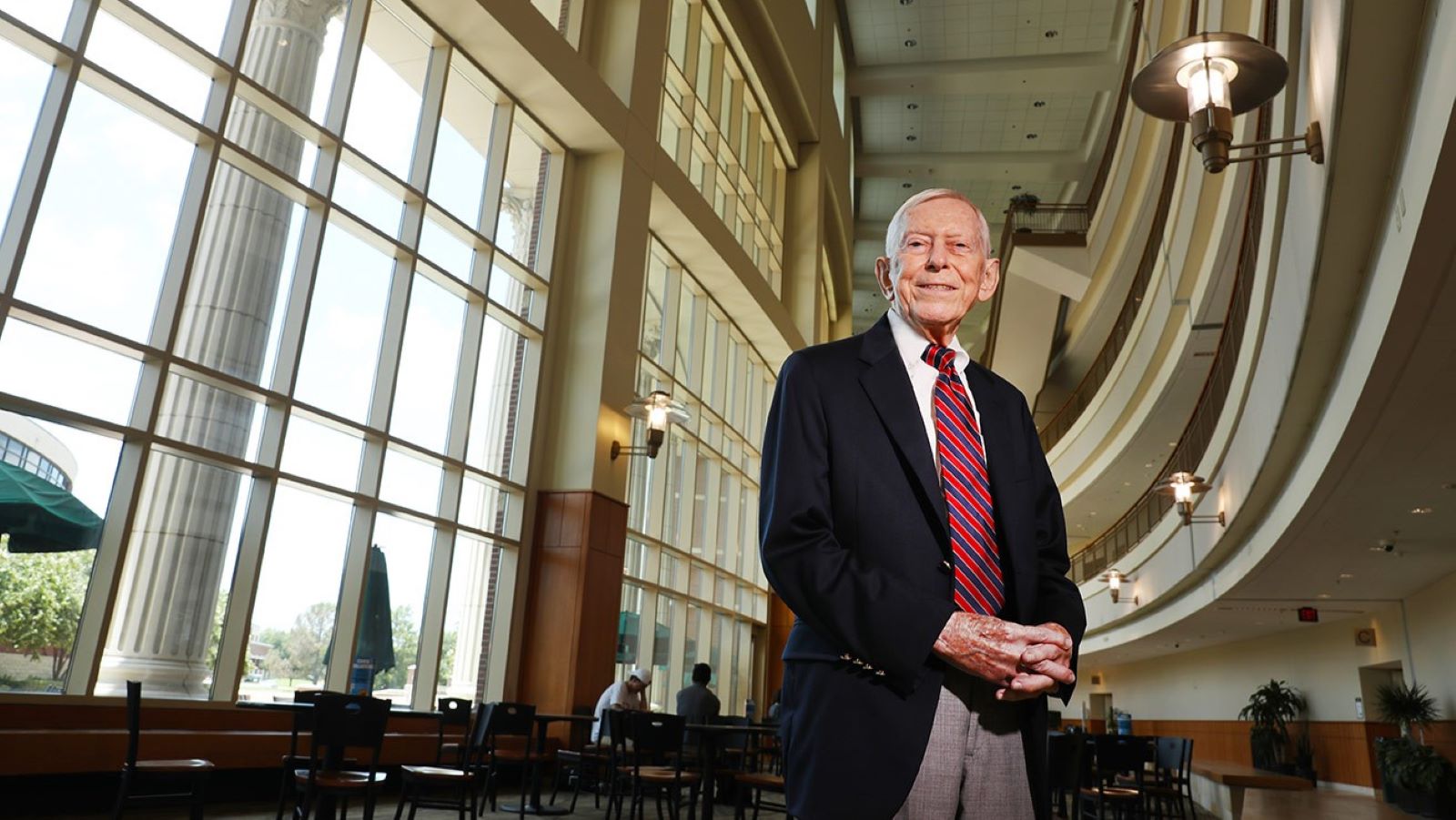
Roger E. Kirk, Ph.D., Emeritus Distinguished Professor of Psychology and Statistics at Baylor University (Baylor University)
Contact: Lori Fogleman, Baylor University Media and Public Relations, 254-709-5959
Follow us on X (Twitter): @BaylorUMedia
WACO, Texas (Jan. 11, 2024) – Baylor University is mourning the death of Roger E. Kirk, Ph.D., Emeritus Distinguished Professor of Psychology and Statistics and the University’s longest tenured faculty member at 61 years. Dr. Kirk died Saturday, Dec. 30, 2023.
He is survived by his wife, Jane Abbott, Emeritus Associate Professor of Keyboard Studies in the Baylor School of Music. They married on June 26, 1987, and in addition to teaching, were well-known for their passion for ballroom dancing, teaching ballroom dancing and competing in dance competitions. As noted in Dr. Kirk’s obituary, many of his students recall how he refocused them during class: by breaking “into a cha-cha or rumba dance step. That never failed to recapture student’s attention.”
A service celebrating Dr. Kirk’s life will be held at 1 p.m. Wednesday, Jan. 17, 2024, at First Presbyterian Church, 1100 Austin Ave., in Waco, with Rev. Leslie King officiating. Burial will follow at Oakwood Cemetery. Visitation will be held from 4:30 to 6:30 p.m. Tuesday, Jan. 16, in the Foundation Parlor at First Presbyterian.
“There are few professors in Baylor’s history who have had the impact and left such a legacy at Baylor like Dr. Kirk,” said Baylor President Linda A. Livingstone, Ph.D. “He was a preeminent researcher in experimental design and statistics, but what his students and his faculty colleagues remember most about Dr. Kirk was his love of teaching. He was a Master Teacher, the highest honor granted to Baylor faculty members for sustained excellence in teaching at the University. Whether he was teaching statistics to psychology majors or behavioral statistics to graduate students, Dr. Kirk impacted the lives of thousands of Baylor students. We extend our love and deepest condolences to his beloved wife, Jane. The Baylor Family is holding her close in our prayers as we share in remembering and celebrating the life of one of Baylor’s legendary professors.”
“Dr. Kirk was a genuinely exceptional faculty member, one who excelled in every aspect of his career,” said Charles A. Weaver III, Ph.D., associate dean for sciences in the College of Arts & Sciences and professor of psychology and neuroscience. “He was an internationally recognized scholar, one of the true legends in the field of behavioral statistics. He was a gifted and dedicated classroom teacher, having taught statistics to thousands of students during his six decades at Baylor. Those of us who had the good fortune of working with Dr. Kirk knew him as a warm and generous colleague, and a welcoming and wise voice of leadership and experience in the department and throughout the University.”
Born in Kentucky, Dr. Kirk earned a B.S. in music education in 1951 from Ohio State University and his M.A. in music in 1952. He then enrolled in Ohio State’s Ph.D. program in experimental psychology. After receiving his Ph.D. in 1955, he accepted a position as the senior psychoacoustic engineer with the Baldwin Piano and Organ Co. in Cincinnati, Ohio, engaging in research to improve the sound quality of acoustic and electronic pianos and organs.
In 1958, he accepted a position as an assistant professor of psychology at Baylor. By all accounts, Dr. Kirk was an exceptional teacher. He quickly earned tenure and was promoted to associate professor in 1960. Four years later, he was promoted to full professor and directed the Department of Psychology graduate program from 1969 to 1976.
In 1971, Kirk received a National Science Foundation postdoctoral fellowship to study statistics and quantitative psychology at the University of Michigan. Following his return to Baylor, he founded a doctoral program in behavioral statistics. The program eventually became an interdisciplinary Institute of Statistics, now the Department of Statistical Science. After directing the doctoral program and institute for 25 years, Dr. Kirk stepped down to devote more time to writing and research.
Three professional activities were sources of immense joy for Dr. Kirk: teaching statistics, doing statistics research and writing statistics books. His first book, Experimental Design: Procedures for the Behavioral Sciences, was designated a Citation Classis by the Institute for Scientific Information and is one of the most frequently cited books in the field. He authored six other statistics books and 130 scientific articles.
During his long and distinguished career, Dr. Kirk was the recipient of many honors and awards for his teaching and research. He was a past president of the Society for Applied Multivariate Research, the Southwestern Psychological Association and Division 5 of the American Psychological Association. He was a fellow of five divisions of the American Psychological Association (Divisions 1, 2, 5, 13 and 21). He also was a fellow of the American Association for Psychological Science, American Educational Research Association and the Southwestern Psychological Association.
At Baylor, Dr. Kirk has received numerous accolades, among them the title of Master Teacher as one of the first faculty to receive the designation in 1993, Outstanding Tenured Teacher in the College of Arts & Sciences in 1993, the Herbert H. Reynolds Award for Exemplary Service to Baylor in 2008 and the Cornelia Marschall Smith Professor of the Year award in 2012 for exceptional teaching, research and service.
Dr. Kirk’s greatest legacy was the impact he made in the classroom, teaching statistics to virtually every psychology major – literally over 10,000 students. He was a model of excellence in the way he carried out his scholarship and the joy with which he approached his teaching. His sense of humor was evident in his teaching of statistics.
“Roger Kirk was a rare kind of person. As a methodic scholar and savvy leader, he made seminal contributions to the fields of psychology and statistics as well as helped shape Baylor into the University it is today,” said A. Alexander Beaujean, Ph.D., professor of psychology.
“Roger was also a benevolent and generous person, who had a droll sense of humor and loved to break into a ballroom dance during his classes," he said. "It is this distinct humanness that endeared him to his students—so much so that they would beam with pride during alumni events to tell him that their children (or grandchildren!) are taking his courses. This humanness is also what his colleagues in Waco and around the world will continue to remember fondly.”
In 2019, ahead of Dr. Kirk’s official retirement, Beaujean and Weaver honored Dr. Kirk by dedicating an issue of The Score, a flagship newsletter for the American Psychological Association (APA) Division 5, the Division for Quantitative and Qualitative methods. They wrote a biography on Dr. Kirk, highlighted his publications and colleagues’ reflections on their interactions with him and included a case study on what made Dr. Kirk a Master Teacher. In fact, while observing the Master Teacher in action, Beaujean noted specifically five common themes that Dr. Kirk presented in the classroom: humor, rigor, care and respect for students, anecdotes and examples, and material reviews.
“Personally, I learned a great deal by observing Kirk,” Beaujean said.
In addition to his wife, Jane, Dr. Kirk is survived by his brother-law, William Abbott; sister, Barbara Chandler of Talbot, Tennessee; and niece- and nephew-in-law, Giulia VanAvery and David VanAvery of Syracuse, New York.
To honor Dr. Kirk’s legacy and memory, the family has established The Roger E. Kirk Endowed Chair in Quantitative Psychology at Baylor University. Gifts in memoriam can be made online to the Dr. Roger E. Kirk Endowed Chair or sent to University Advancement, One Bear Place #97026, Waco, Texas 76798.
ABOUT BAYLOR UNIVERSITY
Baylor University is a private Christian University and a nationally ranked Research 1 institution. The University provides a vibrant campus community for more than 20,000 students by blending interdisciplinary research with an international reputation for educational excellence and a faculty commitment to teaching and scholarship. Chartered in 1845 by the Republic of Texas through the efforts of Baptist pioneers, Baylor is the oldest continually operating University in Texas. Located in Waco, Baylor welcomes students from all 50 states and more than 100 countries to study a broad range of degrees among its 12 nationally recognized academic divisions.
